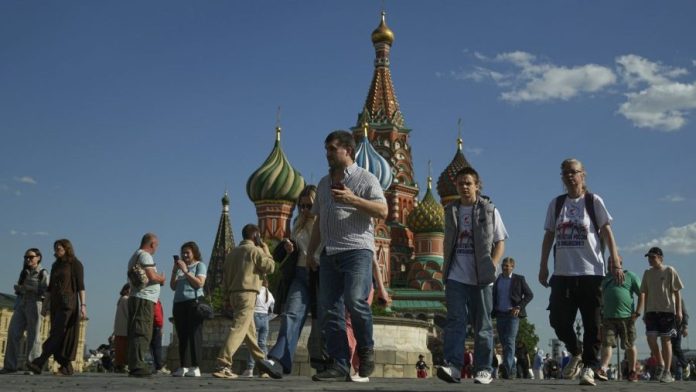
In Russia’s view, the Western world has a big problem: It doesn’t like Russians.
The reason, in the Kremlin’s telling, is not Russia’s devastation of Ukraine or its nuclear threats. Instead, the culprit is “the propaganda of Russophobia, unleashed by the West.”
Recent weeks have seen a new burst of Russian talk about “Russophobia,” a term that implies that fear of Russia is a form of mental illness. While anxiety about Russia appears quite rational these days, Moscow wants to depict Russophobia as an unhinged ideology that the world must join forces to oppose.
On July 26, Foreign Ministry spokesperson Maria Zakharova called for establishment of an “International Day Against Russophobia,” much like International Holocaust Remembrance Day. Two days before that, the Russian Foreign Ministry issued some 150 examples of “hate speech” toward Russia by Western “officials and elites.” The examples, separated into collections from 2024 and 2025, were mainly from government figures.
The “hate speech” in question included statements to the effect that Putin is a dictator and Europe’s enemy; that peace depends on Western strength; that Putin is emulating the tactics of Stalin and the Nazis; that the Russian president cannot be trusted even after a ceasefire; and that Europe should be on the alert for Russian spies and assassins. The 2025 list includes Sen. Lindsey Graham’s (R-S.C.) suggestion that Putin “ask the Ayatollah” if he wants to know what Trump might do if Putin fails to declare a ceasefire in Ukraine.
Judging from the list, the Kremlin’s definition of hate speech seems mainly to be negative comments about the actions of Putin’s government. The examples contain no blanket indictments of the Russian people. There is nothing along the lines of the eliminationist rhetoric about Ukrainians that proliferate on Russian television: that they are rats, roaches, flea-ridden dogs and pigs; that anti-Russian beliefs need to be beaten out of Ukrainian children’s heads; and that Ukrainians deserve “no New Testament ethics.”
The ministry’s 2025 list has already led to a diplomatic explosion between Moscow and Rome. The collection included a comment by Italian President Sergio Mattarella that compared the invasion of Ukraine to actions by the Third Reich. Italy’s Foreign Minister, Antonio Tajani, summoned the Russian ambassador July 30 to declare that including Mattarella in a list of Russophobes was “a provocation to the republic and the Italian people.”
The ambassador, Alexei Paramonov, retorted in an August 8 Izvestia interview that “two new viruses have penetrated the Italian elite in place of COVID: Russophobia and Ukrophilia, which are taking on particularly aggressive forms.”
Russian-Italian relations were already strained after the cancellation of a concert with Russian conductor Valery Gergiev, whose planned appearance at a music festival near Naples had brought an outcry from opponents of Russia’s war in Ukraine. In response, Russian media said, Kremlin sympathizers hastily organized “anti-Russophobia” events in seven Italian cities, featuring posters, concerts and film showings.
The concept of Russophobia isn’t new, per se. Use of the term became common in Russian official speech after the 2014 Maidan Revolution in Ukraine. Putin used it twice in his lengthy 2021 article laying out his grievances against Ukraine. Russia called a special U.N. Security Council meeting in March 2023 to discuss Russophobia, where its delegates faced assertions Russia was using the issue to cover up its own war crimes. In May, Moscow authorities used alleged Russophobia as a reason for outlawing Amnesty International.
Where might this newly invigorated anti-Russophobia campaign lead? Russian officials may press international conferences on racism, religious discrimination and similar issues to include Russophobia in the discussions. And even if some ridicule the idea, in light of Russia’s action in Ukraine, Russian spokespeople will nevertheless gain new forums to spread their version of the war.
Russia might also induce a few friendly countries to add Russophobia to their hate speech laws. Such a gambit would not only outlaw critics of Russia in those countries, but allow the Kremlin to claim that the campaign against Russophobia was gathering speed.
Focusing on Russophobia, however, has flaws as an international propaganda strategy. Complaining about people not liking Russia suggests a stunning lack of self-awareness for a nation pounding its neighbor into rubble. Moreover, the assertion that Western propaganda is strong enough to spread waves of Russophobia worldwide makes Russia look feeble.
Russia is right about one thing, though: the claim that a lot of Westerners don’t like Russians. A June Pew Research poll found that across 13 NATO countries, 84 percent had no confidence in Putin and 79 percent had an unfavorable opinion of Russia. Given Russia’s recent behavior, those views are not surprising.
Thomas Kent is senior fellow for strategic communication at the American Foreign Policy Council in Washington, D.C. He teaches at Columbia University and is a consultant on Russian affairs and the world information war.

